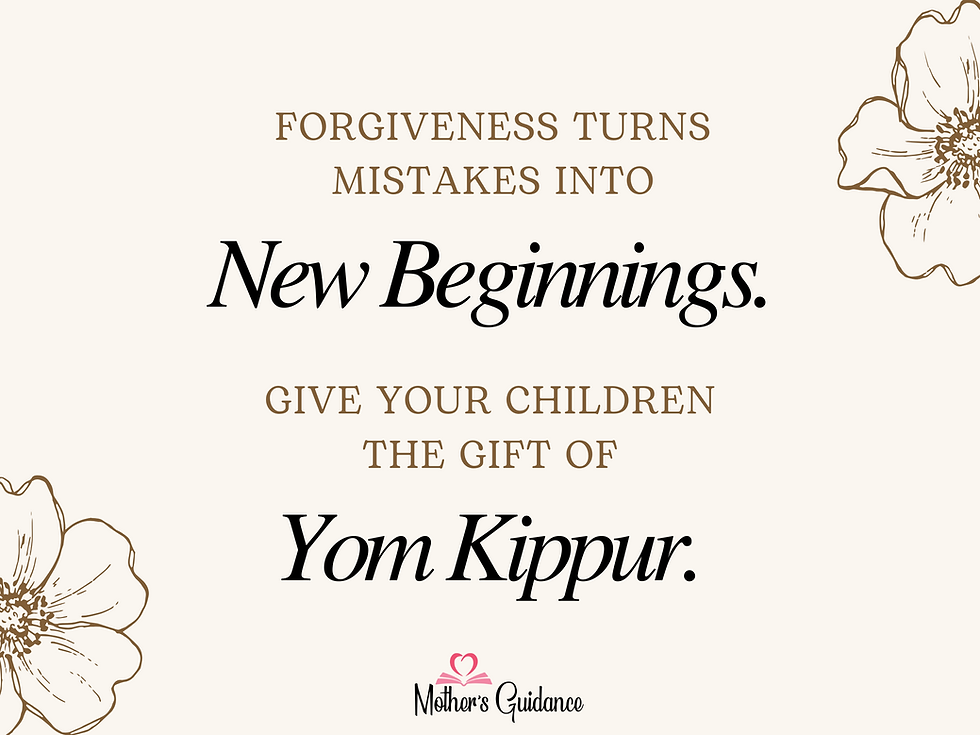Holding a Relationship Through Pain
- Jul 25, 2023
- 3 min read
Updated: Jul 26, 2023
What is the difference between the following two scenarios?
A mother and her fourteen year old son are at loggerheads. Although she tries to remain calm, the situation quickly escalates, and her son’s anger explodes.
Scene A:
Mom looks up at her tall teenager and says, “I’m feeling upset and need to take some time to calm down. I’m going to my room now, but will come out again in a bit. We’ll continue the conversation another time. It’s hard now, but we’ll be okay.”
Scene B:
Mom looks up at her tall teenager and says, “You make me furious! I can’t stand being near you. Go to your room!”
Although the teenager will (probably) respond poorly to both scenarios, the fundamental difference is that in Scene A, the mother offers reassurance that their relationship will survive the challenge. The importance of this can’t be overstated.
This Thursday, Jews around the world observe the fast of Tisha B’Av, (the ninth day of the month of Av), a day of intense mourning marking the destruction of the Holy Temple in Jerusalem as well as other tragedies throughout Jewish history. Fascinatingly, even as we sit in darkness on the floor, reading Eicha, the book of Lamentations, there is a ray of hope. We conclude Eicha with the verse, “Restore us to You, O Lord, that we may be restored! Renew our days as of old.” The tragedies of millennia didn’t sever our relationship with God. Rather, they are a symbol that our connection with Him is eternal. The very same prophets who prophesied destruction also prophesied comfort and hope. The pain of Tisha B’Av is supposed to be a catalyst for repentance and an ultimate restoration of our relationship. Indeed, Jewish tradition teaches that redemption will begin on Tisha B’Av. Tisha B’Av isn’t a rejection of the Jewish people. Amidst the sadness, it contains the seed of hope.
There is a profound parenting lesson inherent in Tisha B’Av. The parent-child relationship must explicitly and implicitly be strong enough to weather all challenges and rebellions. The Jewish people mourn on Tisha B’Av, but aren’t left hopeless. Tomorrow’s hope is intertwined with today’s pain. This is crucial for our children too. Even in the most serious of situations, parents can and must tightly hold the reins of the relationship and tell our children that we will never let go. We must convey that the relationship is stronger than anything they can ever do, and no matter how tough or painful the situation, nothing will break our love and connection.
This helps us understand why parents should refrain from withholding the parental relationship as a tool for punishment. Even as we enforce discipline (or allow natural consequences to unfold), our children must see that our commitment to them will never falter.
For example, when a recalcitrant toddler refuses to leave the playground with us, it’s not wise to threaten to leave without her. She needs to know completely and assuredly that we would never abandon her, no matter how much she tantrums. Similarly, giving a child the silent treatment isn't a wise parenting tactic. Our attention and love isn’t something to manipulate - it's a constant. Our children may be going through a very difficult time and it can be incredibly painful. They may feel very distant from us, but even in that state they should feel that WE aren’t distant. The relationship is always there even when they reject it and even when it is strained.
It’s a tall order to parent this way - it’s very, very challenging, requiring hard work and self-control. But the rewards are exponential.
Share your thoughts please!
What is your experience parenting through painfully tough times?






Your words always seem to be the right message I needed to hear, at the right time!
Great and timely post!